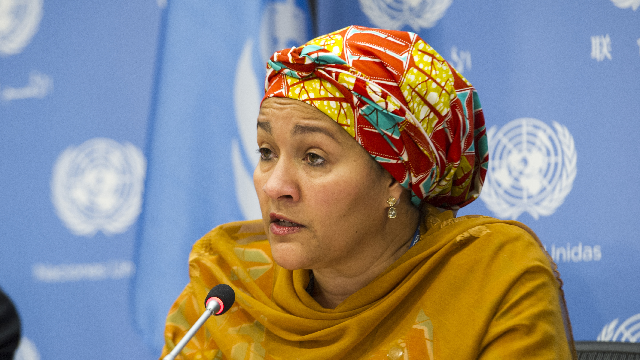By Muhammad Amaan
Deputy UN Secretary-General, Amina Mohammed, said there can be no sustainable development in line with the Global Goals for 2030 without peace.
The UN deputy chief said this at a high-level meeting of Arab States in the Lebanese capital, Beirut, on Tuesday.
Amina Mohammed said the world was facing complex challenges, not least in the Middle East, which was experiencing conflict and instability.
“Persistent and recurrent conflicts and fragility are directly impacting 182 million people in nine countries in this region and exacerbating the refugee crisis.
“The war in Gaza and other crises remind us that there can be no sustainable development without peace.
“And truly sustainable development – here in the Arab world, and across the globe – remains a very long way off,” she said in a statement.
More than halfway to the deadline of the 2030 Agenda, the Sustainable Development Goals (SDGs) are severely off-track, globally and in the Arab region.
According to the Deputy Secretary-General, extreme poverty in the region has more than doubled since 2015 and is now above 20 per cent while unemployment stands at 10.7 per cent.
She said the Arab region was also suffering from a growing financing gap while droughts, floods, the sand and dust storms, and other climate and environmental challenges constricted economic and social development.
She added that carbon emissions had risen 68 per cent between 2000 and 2020, twice as fast as the global trend.
“But against this backdrop, there are signs of hope,” she said.
She noted the pledge of 500 billion dollars a year made during last September’s SDG Summit and reforms to the global financial architecture to make it more equitable, resilient, responsive and accessible to everyone.
“We need to ramp up action around policies and investments that can drive transformative change,” she told delegates.
She said many Arab countries were already accelerating efforts around key transformations from clean energy, food systems, to digitisation, social protection reforms and economic diversification.
Meanwhile, climate change is disproportionately affecting the incomes of rural women, the poor and older populations, says a new report from the UN Food and Agriculture Organisation (FAO).
The Unjust Climate report highlights the reality that every year in low and middle-income countries, female heads of households in rural areas suffer significantly greater financial losses than men.
On average, female-headed households lose eight per cent more of their income due to heat stress and three per cent more due to floods compared with male-headed households.
This translates to a significant per capita income reduction of 83 dollars due to heat stress and 35 dollars due to floods, totalling 37 billion dollars and 16 billion dollars, respectively, across the most impoverished countries.
If average temperatures were to increase by just 1°C, these women would face a staggering 34 per cent greater loss in their total incomes compared to men.
The study suggests that if it is not addressed, climate change will greatly widen these gaps in the years ahead.
“Social differences based on locations, wealth, gender and age have a powerful, yet poorly understood, impact on rural peoples’ vulnerability to the impacts of the climate crisis.
“These findings highlight the urgent need to dedicate substantially more financial resources and policy attention to issues of inclusivity and resilience in global and national climate actions,” FAO Director-General, QU Dongyu, said.




